This post was last updated on February 29, 2024 by Preethi Sukumaran
Acacia concinna , better known as Shikakai, is a herb many of us are familiar with in the Indian sub-continent . As children, many of us would have cried furiously from its sharp, stinging sensation when it accidentally entered the eyes.
Acacia concinna is used for a lot more than just hair care in Ayurveda. It has been documented across texts for its cleansing, wound healing, anti-bacterial and anti-fungal properties. In this article, we will delve into the properties of this ayurvedic herb, its features & its general medicinal benefits.
Acacia concinna : distribution and ecological importance
Acacia concinna is a prickly, climbing, perennial shrub belonging to the family Mimosaceae. It is ecologically an extremely important plant. It grows across rain forests, open grasslands, fields and in the sides of creeks. There are nearly 1350 species of acaia found worldwide. The name is derived from the Greek word “akis” meaning “sharp point”.
The flowers are white in colour secreting ample pollen and a trace amount of nectar. Because of this, this plant is extremely important in conserving ecological biodiversity. All acacia species are key contributor species in bushland, scrubland and even in the savannah. This is because they provide food and other resources for a huge and diverse number of fauna from mammals, to birds and insects. This makes them a very important part of each natural ecosystem . Acacia concinna has a similar importance wherever it grows.

Its pollen and nectar attract a variety of insects like bees, wasps, flies, butterflies, beetles, thrips, mantis, ants, etc. Honey bees are important pollinators of Acaccia species worldwide. If the usage of this herb dwindles and we lose our natural forested land, it has a negative impact on the entire ecosystem, especially honey bees.
The plants flower throughout the year, and the fruiting pods appear in different seasons in different parts in India – sometimes between February and March, sometimes between August – October.
The species has a rich symbiotic relationship with soil bacteria which form nodules on the roots to fix atmospheric nitrogen.
For these properties , its thorny nature, attractiveness to pollinating insects and symbiotic nature with nitrogen-fixing bacteria, it would often be grown in farms and cultivated lands in India. It is a good fencing plant , provides good foliage and is an excellent companion in a fruiting orchard.
However, with increasing pollution in water and the contamination of industrial effluents, this waste water has a direct inhibitory effect on plants like Acaccia concinna. So to conserve our biodiversity we need a two pronged approach : encourage the proliferation of such rich, natural species and control the discharge of effluents and industrial pollutants.
Acacia concinna phytoconstituents
The phytochemical constitution of Acacia soap pods is extremely rich. Different plant parts have different constitution of plant nutrients.

The fruit pods are rich in saponins like flavonoids and monoterpenoids. This contributes to their natural ability to cleanse and perform as surfactants. Besides saponins, the fruit pods are rich in alkaloids, glycosides, amino acids, tannins and phenolic compounds.
Acacia concinna: indigenous to Indian tradition and lore
Acacia concinna with the common name Shikakai is a herb that many Indians love to hate. Acacia concinna in tamil is referred to as “Seeyakai” or சிகைக்காய்ச் . This is a herb that reminds us of 2 things: having our hair washed by our mothers and stinging and watering eyes! But here’s the paradox. Despite the association with the stinging sensation, most of our customers associate Shiakkai with great hair, childhood hair. When hair was naturally thick, strong and voluminous.

Acacia concinna fruit is referred to as “the hair fruit” in India. The Shikakai pod has been used as a biological surfactant to cleanse hair and skin for thousands of years in India. This herb, along with Reetha pericarp, (Soapberry fruit) are part of the large set of plant based cleansers India used to cleanse and disinfect the laundry, dishes and our hair.
Why are plant based clays, muds and cleansers better for us?
Using plant based cleansers like Shikakai, Soapberry, Desert Date is extremely beneficial both to human health and the environment. They contain a relatively low level of natural surfactant, along with other beneficial nutrients. Therefore skin and hair are always protected from excessive stripping of natural oils, breakage of hair and destruction of the acid mantle.
Plant based surfactants like Soapberry and Shikakai also have a naturally mildly acidic pH and are well documented for external use in the Ayurvedic texts. This makes them safe and ideal to use on human skin and hair.
Ayurvedic description of Acacia concinna
Shikakai is called “Satala” in Sanskrit. Its synonyms are “Virala”, “Sari”, “Tatphala” “Charmasahva”, Dipta and also “Bahu phena” (extremely foam generating_ and “Phena” (foam generating).
Madanapala nighantu text tells us that Shikakai has Tikta and Kashaya rasa (bitter and astringent taste), katu vipaka (pungent after digestion), Cold in veerya (potency), laghu (light).

Shikakai has multiple benefits like being Shopha hara (anti inflammatory), Kaphahara and Pittahara (reduces Kapha and pitta), Udvartahara and Raktadoshahara (heals Rakta dosha / blood tissue disorders).
The Raj Nighantu text tells us in addition that Shikakai has other benefits like being useful in Visharpa (erypiselas), Kushta roga , Vishpota (eruptive blisters) and in Vrana Sopha (oedema due to ulcers or wounds).
Acacia concinna medicinal uses
In folk medicine, Acacia soap pod’s analgesic, anti bacterial, insect repellent and wound healing benefits are very effectively utilised. For non specific pain in the leg, hips and joints, this herb is sprinkled on the affected area after a hot castor oil massage and then wiped away, providing great relief to the aching area.
This herb soap pod is also very well employed in traditional medicine as an oral rinse to help cure halitosis, dental caries, mouth ulcers and gum bleeding.
Its kashaya (astringent) properties help by:
- Reducing oral inflammation
- Stopping excessive bleeding
- Helping flush out oral pathogens.

The Acacia soap pod is also extremely useful for many types of skin infection. A decoction of the pods can be used to cleanse stubborn skin diseases with pus and clear exudates like psoriasis, skin rashes .
The fresh aqueous extract, methanolic extract and beneene extract has a strong inhibitory effect on Klebsiella pneumoniae (implicated in drug resistant infections & hospital infections) , Bacillus subtilis, Escherichia coli, and a milder effect on Pseudomonas aeruginosa (common source of hospital infections), and Staphylococcus aureus.
Uses of Acacia concinna in skin disorders
Ayurveda lists many chronic skin conditions like eczema, contact dermatitis and psoriasis, under Kushta Roga. Many of these skin conditions do not have an exact causative factor in allopathy and are usually managed with the use of topical steroids (both ingested and applied locally). Stopping the use of such chemical steroid based products even for a day triggers the condition and it is extremely difficult to live with.
Along with herbs like Kushta, Nimba, Maha Nimba, Shiakakai finds good use in these conditions. Shikakai can be used here for its inflammation healing, wound cleansing and Kushta roga (skin disease) healing benefits. Switching from a synthetic soap (even those recommended for these skin conditions) and using an Ayurvedic choornam or Lepa that uses these healing herbs can give good relief in these conditions.

Ayurveda tells us how the properties of Shikakai gives rise to these skin benefits. Its kashaya (astringent) nature shrinks the thickened growth and brings down inflammation. Because of its tikta (bitter) nature, it is ideally suited to tackle both vitiated pitta and vitiated kapha, so it stops the redness and itching associated with pitta and the skin thickening and expanding nature of kapha vitiated skin diseases. In cases of dandruff and psoriasis where high scaling and thickening is observed due to Kapha vitiation, Shikakai is able to cut down this excessive growth and reduce oozing, pus and sebum in these cases due to its Kaphaghna property.
Krya has a line of sensitive skin products that uses herbs like Shiakakai and is helpful for these conditions. For sensitive skin conditions and dandruff, it is important to follow a balanced diet. A diet that is low in pitta and kapha based triggers will help the condition heal faster. For skin disorders, please download and read our free ebook on food triggers which can aggravate Kushta roga conditions.
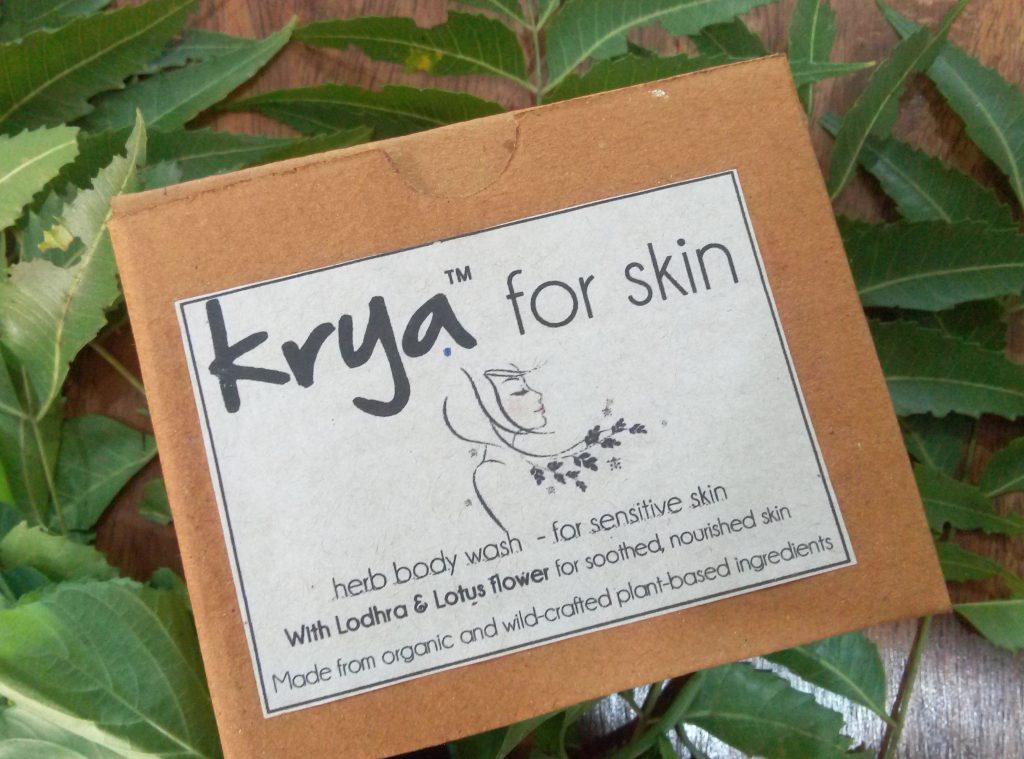
Krya Sensitive Body Wash Powder with Lodhra & Lotus flower- 200 gm
.
Acacia concinna benefits for hair
Many people write to us asking about how Shikakai can be made into a d.i-y shampoo powder. An ayurvedic herb based hair wash powder is the best no-poo shampoo option that you can find. It is milder, safer and more beneficial for hair. It is also genuinely natural and cleaner for soil and the environment. Therefore using Shikakai as a part of your DIY shampoo beats no-poo shampoo ideas like using baking soda, and apple cider vinegar or castille soap on hair.
Being called “Bahu phena” and “Phenila”, Shikakai is also an excellent cleansing fruit. The cleansing action, unlike synthetic surfactants like SLS and SLeS is extremely mild, of acidic pH and does not damage hair and scalp condition.

However, all plant surfactants like Reetha, and Shikakai MUST be used only on WELL OILED hair. So before trying these options, ensure that you oil the hair generously, preferably with a good ayurvedic hair oil.
If you are wondering if Shikakai can improve hair thickness, please do understand that Shikakai alone cannot help. A loss in hair thickness is due to a high aggravation in Pitta dosha and this must be tackled on multiple fronts. Please read our blog post on how to increase hair volume naturally for more information on this.
Also, remember that all synthetic shampos are loaded with artificial conditioners like silicones, and other thickeners and chemical coating agents. When you use a purely herbal hair wash power, such ingredients are missing – so you will notice the ACTUAL texture of your hair .
If you have been using synthetic shampoos for sometime, it is very likely that your hair is actually dry, coarse and brittle in nature. This is NOT due to Shikakai or Reetha but this is the actual condition of your hair. So don’t panic and continue with the natural hairwash. With regular hair oiling the texture will improve.
Also ensure that you formulate your hairwash powder properly. Conditioning herbs, acidic herbs and astringent herbs must be added to balance the cleansing effects of surfactant herbs like Shikakai, Reetha etc. If you merely use plain Shikakai or Reetha to wash the hair, the hair will feel slightly dry.
DIY hair wash recipe ideas with Shikakai
Shikakai or Reetha should NOT be used as is to cleanse hair. It can be extremely drying and stiffening on hair. Even though it is a very mild surfactant compared to a synthetic shampoo, we must add other herbs that enhance and complement the properties of Shikakai.
Some herb addition ideas are:
- Amla – sweet nourishing and scalp healing
- Hibiscus Flower – naturally conditioning, scalp healing
- Hibiscus Leaf – naturally cleansing and muciligianous, adds a pleasant texture to hair wash
- Neem Leaf – anti bacterial and anti fungal properties
- Orange Peel – oil balancing , freshness
- Mung bean – gently cleanses without stripping hair of natural oils
Experiment with the proportion of these herbs until you get a product that you like and works well for you. Rememer that Shikakai should ideally be under 35% by weight of the entire formulation.
Acacia concinna fruit powder use for fungal dandruff
Ayurveda teaches us that the benefits of Shikakai lie in its skin cleansing, anti inflammatory, pitta and kapha healing properties. It is also an excellent anti fungal herb. Shikakai has a unique ability to cleanse without irritating the scalp and controls fungal spread.
This is extremely important when dealing with chronic dandruff because we always see small lesions and wounds on the scalp which have formed due to the inherent itchiness because of this condition.
For chronic cases of scalp psoriasis and fungal dandruff using Shikakai as a key herb in soothing natural formulations can give great relief.
Krya has a line of anti fungal dandruff healing products that use Shikakai . Please explore these products here.
How to use Acacia concinna in natural home cleansing products
Apart from skin care and hair care, Shikakai finds a very important place in Krya’s line of home cleaners. Home care today is fraught with risk as the synthetic cleansers we use at home are highly toxic, and pollute the air, affect human health, trigger skin sensitivities and respiratory illnesses and also pollute the water and soil. We launched our line of home care products as an alternative to these chemical pollutants.
Krya’s line of home cleaners uses plant based surfactats like Arishtaka, Shikakai, Desert date instead of LABSA and SLS and SLeS and other Chemical surfactants. Along with these surfactants we use a wide variety of anti bacterial, anti fungal, astringent and aura cleansing herbs to make various home care products like floor cleaners, detergent products, etc.
Chemical dishwash products are highly irritating on skin and can trigger minor forms of Kushta roga like contact dermatitis. Using a multi purpose herb like Shikakai in these formulations helps us do the basic job of cleansing, while taking care of the skin and also ensuring that the discharge from the housework does not pollute soil and water. Shikakai has excellent application as a non toxic , gentle plant surfactant, esepcially in colour neutral applicaions like dish wash, floor cleaning, etc.
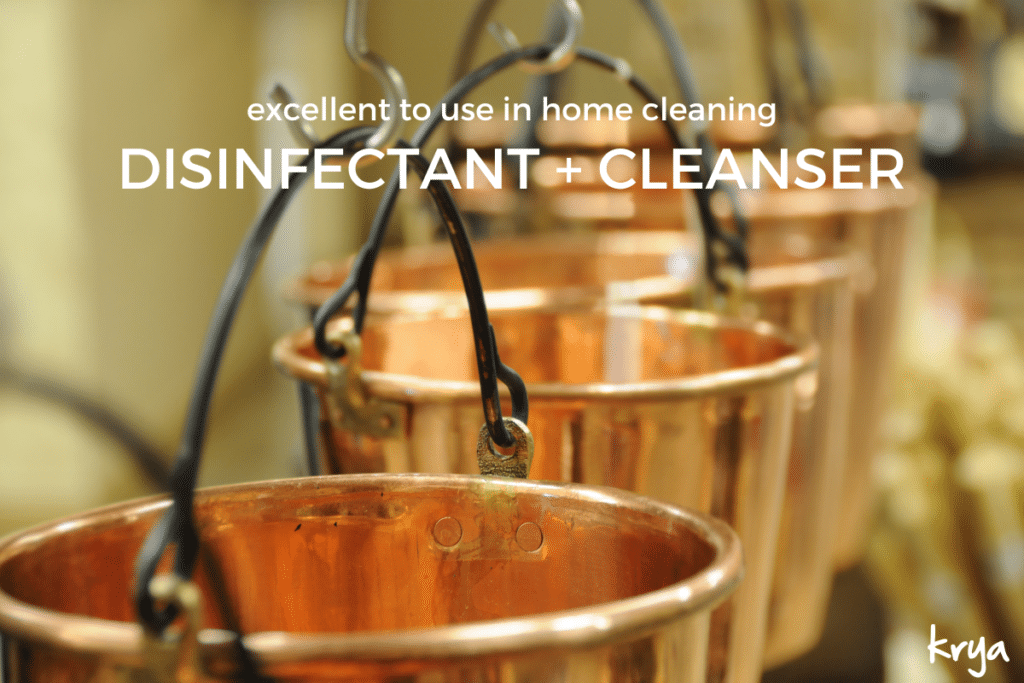
It has potent use in home disinfecting, and in out patient care as a natural cleanser and bacterial inhibitor. We use Shikakai extensively in our range of Natural floor cleansers and tile cleaners. The use of herbs like Shikakai is documented in Sushruta samhita in disinfection and cleanliness practices to be folowed in surgical wards.
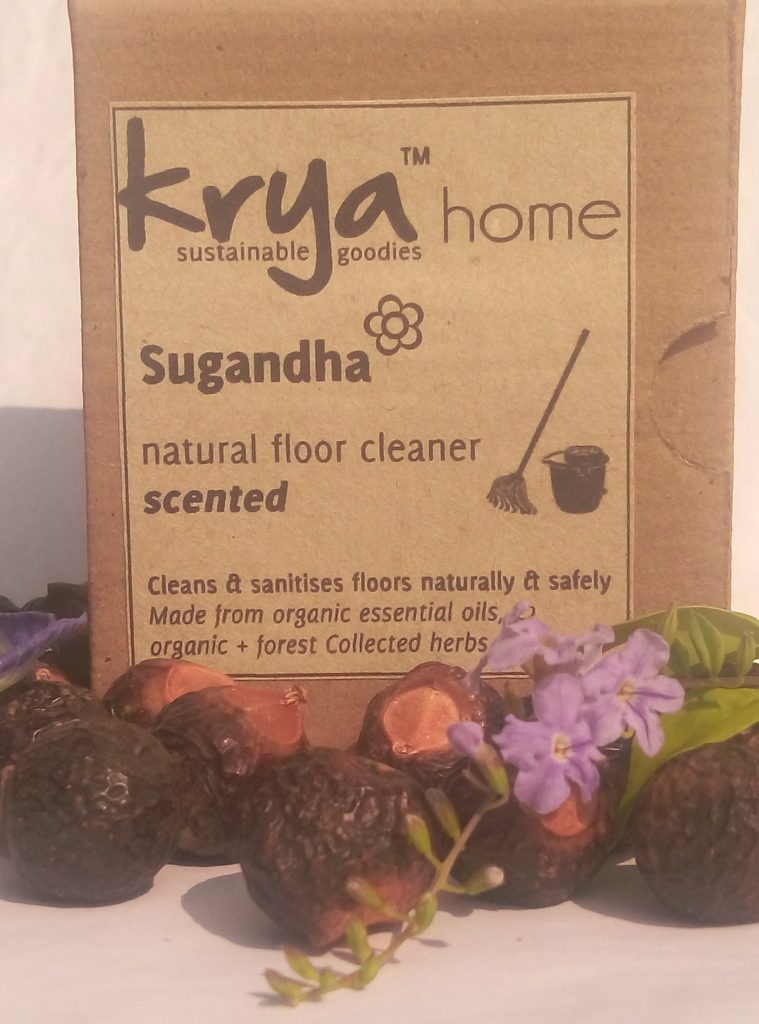
Krya Natural Floor Cleaner – Sugandha (scented)(200 gm)
Other uses of Acacia concinna fruit
Studies have established many interesting uses and benefits of Acacia concinna. Its extract has applications in preventing corrosion in Mild steel. Silk fibroin from silkworms is a part of the silk cocoon generated by silkworms. Silk fibroin currently is extracted using a toxic mixture of effluent chemicals. Silk fibroin has significant application in tissue engineering, wound dressing , drug and gene delivery. A more sustainable and low toxic method of extaction using bioactives from Shikakai shows excellent promise. This is apart from its direct application as a natural insecticide.
To sum up: the ayurvedic properties and benefits of Shikakai
Shikakai is an important ayurvedic herb with specific properties like having bitter and astringent taste, kapha and pitta balancing properties, being anti-inflammatory, wound healing, etc. Shikakai is therefore extensively used across India in both Ayurvedic and Siddha medicinal systems and in folk lore for its multiple benefits. We explored the properties of this important herb through various Ayurvedic canonical texts.
Our work at Krya is part of our larger mission to bring in more awareness of traditional Indian medicinal systems like Ayurveda and Siddha, and inculcate a sense of pride in India’s deep historical, cultural, spiritual and medicinal traditions. We also exist to bring in a sense of balance: there are too many products and companies out there recklessly and thoughtlessly endangering human health, water and soil health by using highly toxic and dangerous chemicals to formulate everyday consumer products. We exist to provide you with safe, holistic and sustainable alternatives using India’s divine and sacred herbs.
We do herb related posts at Krya to give you a glimpse into just how potent, powerful and good for us the plants used in Ayurveda are and to help you understand how safe and effective hair, skin and home care products can be easily formulated using these healing herbs. We hope you found this post inspiring and useful. Please go through our other herb posts on other ayurvedic herbs like Bael, Arishtaka, Vacha, Daruharidra, Mulethi, Mushta, Durva, etc. Do also go through our posts on Hair care herbs around the world.
If you too would like to transition to our holistic sustainable goodies and need help choosing products, please call us (0-75500-89090) or write to us.
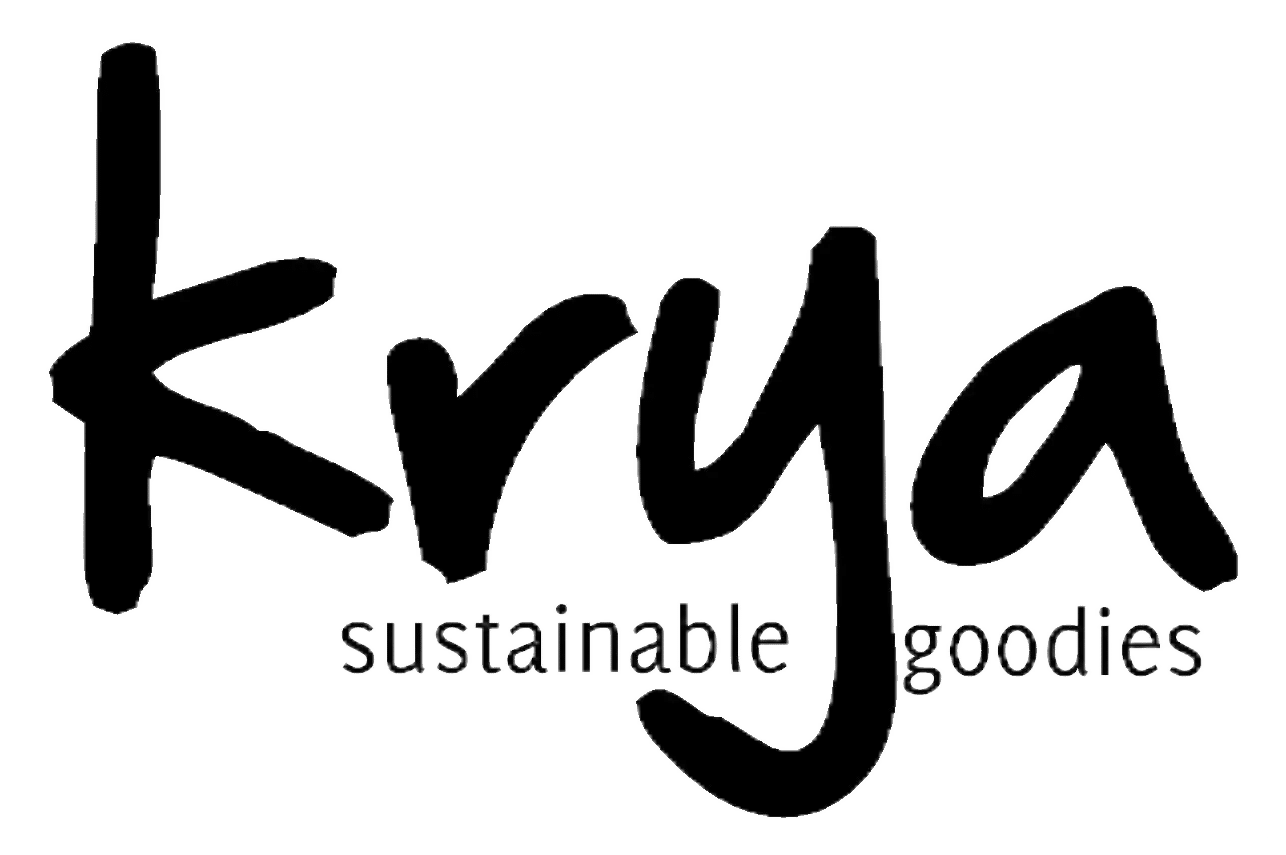
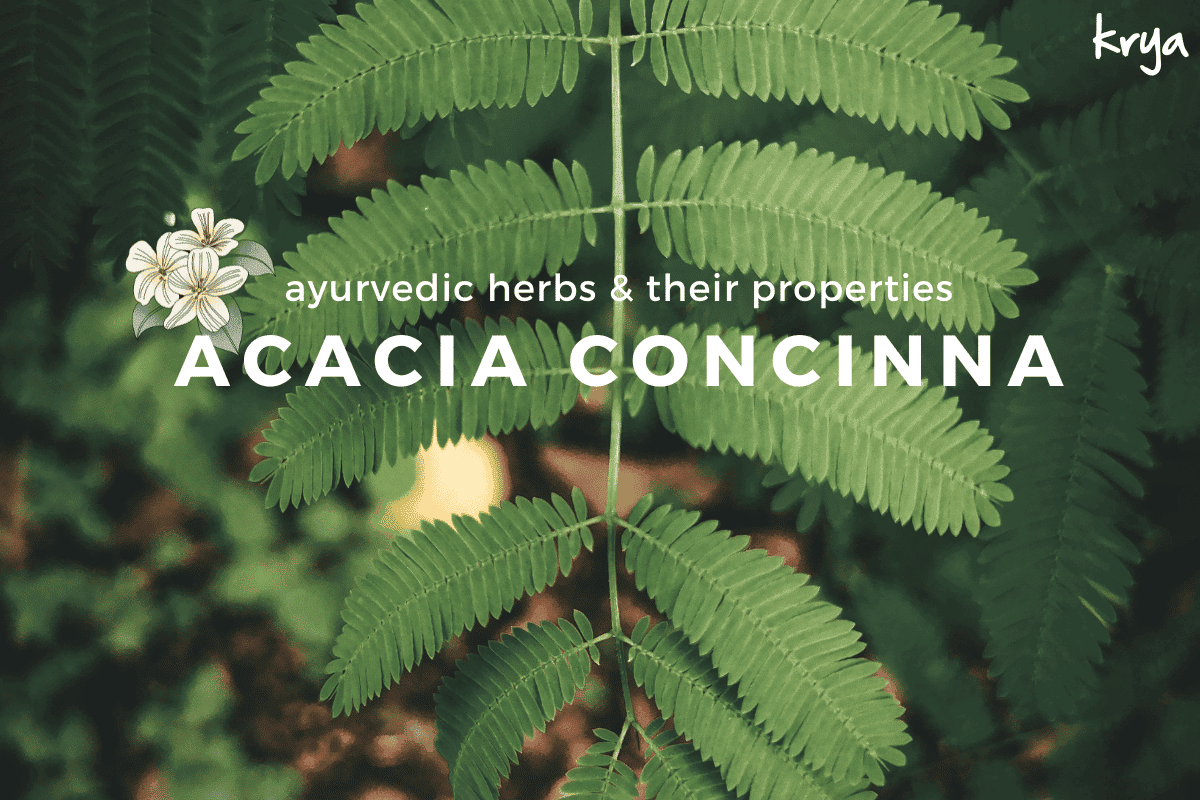




Nice write up Preethi. Indeed this had taken me to my voluminous hair days and myself crying to my grandmom on Sunday mornings.
Also could you do you write on the herb “liquorice”?